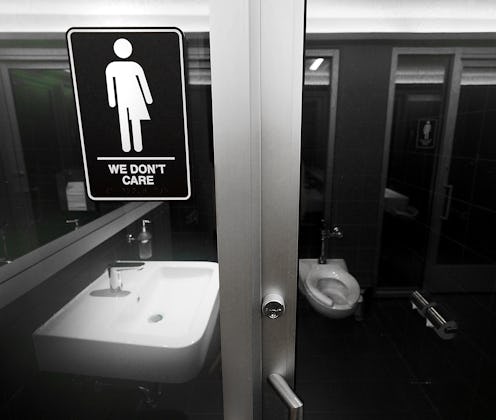News
Transgender People Face Greater Risks In Bathrooms

The Trump administration's decision to roll back Obama-era guidelines on bathroom access and transgender students at public schools has thrust the argument over who should pee where back into national debate. But while debate rages over the imaginary threat transgender people pose in the bathroom, the largest survey of transgender people ever conducted found transgender people are more at risk when it comes to using public restrooms than their cisgender compatriots.
A survey released last year by the National Center for Transgender Equality has brought much-needed data into debate over transgender bathroom access. The survey, which represented an estimated 2 percent of America's adult transgender population in 2015 with 27,715 respondents, found the lack of safe bathroom access can have a detrimental affect on the health and safety of transgender people.
Nearly 60 percent of transgender people in the United States have avoided using a public restroom out of fear after having been harassed and/or assaulted, the survey found. A total of 24 percent of respondents said their presence in a restroom had been questioned within the last year. Twelve percent reported having been harassed, attacked, or sexually assaulted in a restroom within the last year. And 9 percent said they were denied access to a restroom that best matched their gender identity in the last year.
The survey's findings directly counter conservatives' argument that transgender people somehow pose a risk to others in the restroom. For example, North Carolina lawmakers behind the state's controversial HB2 (which stated that transgender people who have yet to take the necessary surgical and legal actions to change their gender have no legal right to use public restrooms corresponding to their gender identity) argued the bill would protect women and children from men who might pose as transgender women in order to sexually assault them in the restroom. However, there is little evidence to support this argument and a coalition of more than 200 local, state, and national organizations who work with sexual assault and domestic violence survivors have firmly rejected the notion of the transgender bathroom predator.
While conservatives continue to argue transgender-inclusive policies pose a safety risk to the cisgender population, the National Center for Transgender Equality's survey provides real evidence regarding the harmful physical and mental health affects the lack of a safe restroom can have on transgender people. A total of 31 percent of respondents reported not eating or drinking in order to avoid having to use the restroom when out in public, 8 percent reported having a kidney-related medical issue, such as a urinary tract infection, in the last year due to holding in their urine for long amounts of time. The survey also found 39 percent – eight times the reported rate for the general population – of respondents experienced serious psychological distress within the previous month.
"The findings reveal disturbing patterns of mistreatment and discrimination and startling disparities between transgender people in the survey and the U.S. population when it comes to the most basic elements of life," the National Center for Transgender Equality said in their report on the survey's findings. "The report provides evidence of hardships and barriers faced by transgender people on a day-to-day basis. It portrays the challenges that transgender people must overcome and the complex systems that they are often forced to navigate in multiple areas of their lives in order to survive and thrive. Given this evidence, governmental and private institutions throughout the United States should address these disparities and ensure that transgender people are able to live fulfilling lives in an inclusive society."
Under President Donald Trump, the Departments of Justice and Education on Wednesday revoked guidance set forth by the Obama administration extending Title IX non-discrimination provisions to transgender students, arguing the issue of transgender bathroom access should be decided by the states. Opponents of the Trump administration's decision, however, have argued the war of transgender bathroom access is, at its core, an issue of federal civil rights protections, making federal intervention necessary in order to block discriminatory policies passed at the state level.
"Transgender students thrive when treated equally, but too often they are not," National Center for Transgender Equality Executive Director Mara Keisling said in a statement released Wednesday. "These young people already face incredible hurdles in their pursuit of education and acceptance. With a pen stroke, the Trump Administration effectively sanctions the bullying, ostracizing, and isolation of these children, putting their very lives in danger."